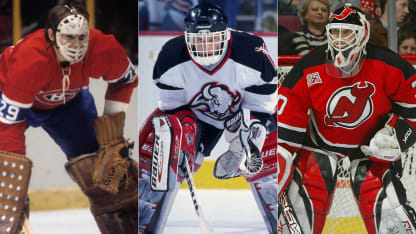The sterling work of Dryden and backup Michel Larocque in the historic 1976-77 season, allowing 171 goals, was a perfect complement to the Canadiens' massive firepower. Montreal went 60-8-12 (ties) for an NHL record 132 points and was the runaway offensive leader among the 18 teams with 387 goals, 64 clear of the second-ranked Flyers, who scored 323. But it was Dryden and Larocque who gave the forwards the confidence and freedom to be creative. The tandem allowed 20 fewer goals than their closest pursuers, New York Islanders goalies Smith and Glenn Resch. Dryden was 41-6-8 (ties) with a 2.14 GAA, .920 save percentage and 10 shutouts, on average one shutout every 5.6 games. Larocque, who earned the Vezina by making 26 appearances, was 19-2-4 (ties), a 2.09 GAA and .910 save percentage, his four shutouts averaging one every 6.5 games. -- Dave Stubbs, columnist

